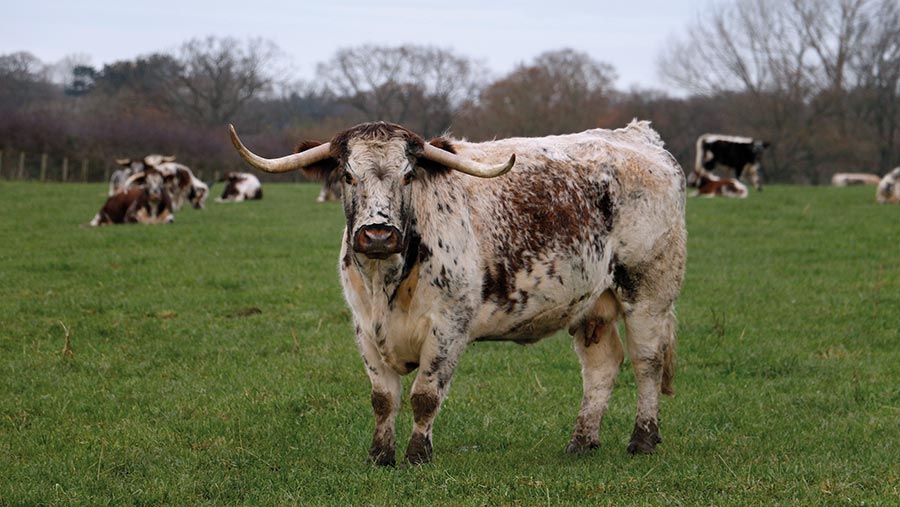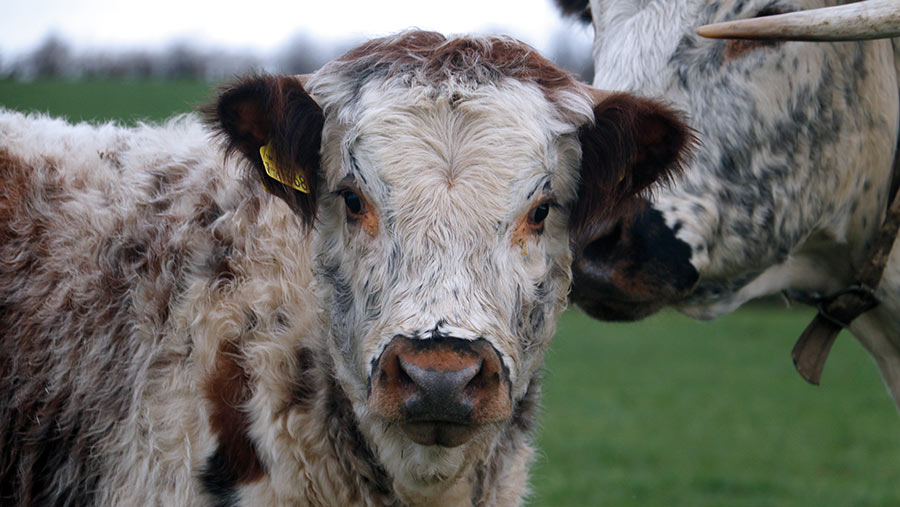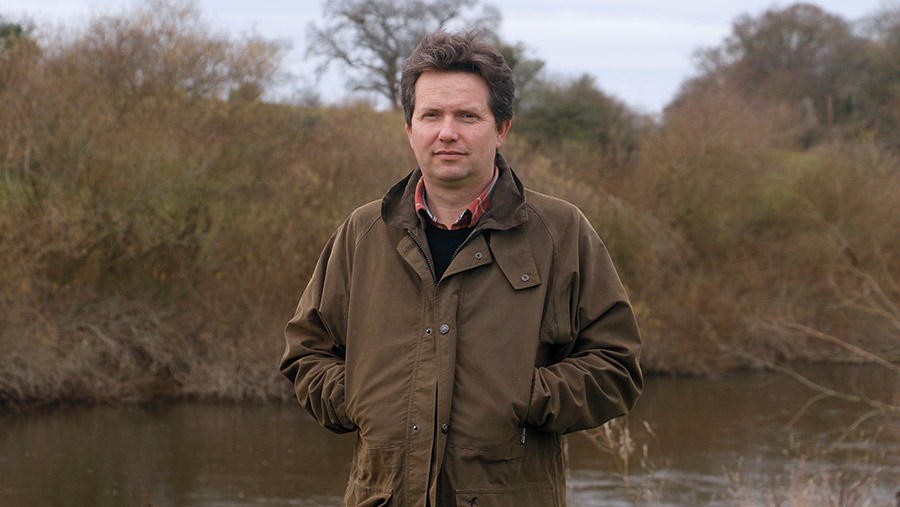How a heritage beef breed is adding value to Shropshire farm
 © MAG/Rhian Price
© MAG/Rhian Price Organic farmers Sam and Claire Barker are using the UK’s oldest heritage breed to dovetail with their arable and poultry enterprises to keep inputs low.
Their herd of 300 pure Longhorns have been a fixture at Great Berwick Farm for 16 years, after Mr Barker, and his father Stephen, decided to sell their prize-winning herd of organic Holsteins in favour of a better work-life balance.
Some of the foundation females were sourced from Adam Henson on the Barkers’ second date. They have now grown the herd to 80 suckler cows plus followers, which they run with the help of their children, Tom and Eleanor.
See also: Direct farm sales take off during lockdown to #FeedTheNation
The herd complements their organic cereal production and 8,000-bird layer enterprise, with the cattle fertilising the soils organically with manure and improving organic matter.
Farm facts
- 300 Longhorn beef cattle
- Farming 230ha (570 acres) in total – 89ha (220 acres) tenanted, 45ha (110 acres) owned and 101ha (250acres) on a summer grazing licence
- 8,000 organic laying hens
- Barley sold to a local, organic dairy
- In Higher Level Stewardship scheme
- Employs one full-time poultry manager, plus two butchers
They are 100% self-sufficient in feed, with the cattle fed a diet of grass and home-made, quality forage year-round.
The couple, who farm alongside The River Severn near Shrewsbury, say the herd fits perfectly with conservation grazing required in the Higher Level Stewardship scheme too, grazing river meadows in the summer.
To capitalise on this great story, they take all progeny through to finishing, with all beef sold direct from farm.
Breeding and management
The herd is split into autumn and spring calving blocks to try to keep a level supply of meat year-round.
The spring block starts calving from 1 March for nine weeks and the autumn block calves from 1 September for nine weeks.
The herd calves outside, with very few requiring assistance.

© MAG/Rhian Price
The calves and cows are sent away in the summer to rented ground, where they graze 101ha (250 acres) of ancient parkland. They rotationally graze 8ha (20 acres) at a time and are stocked at a low rate of two cows an acre to prevent overgrazing.
“We are recreating traditional grazing habitats. Cows choose what they want to eat to balance their diet,” explains Mr Barker.
The calves are weaned at 11 months, just prior to the cows calving again, and steers and heifers are taken through to finish aged 26-30 months. Cows and calves are kept outside all year on deferred grazing, while growing cattle are housed for up to five months over winter and fed high-quality, home-made forage.
Arable
They have 97ha (240 acres) of arable ground, which is in a crop rotation of two years of barley before being undersown with break crops of either red clover or lucerne.
The red clover is grazed in the autumn with growing stock and the lucerne is baled and dried to feed to the hens, to provide enrichment, as well as the growing cattle over the winter.
Mr Barker says the legumes are fundamental in their organic rotation, fixing nitrogen so they don’t require fertiliser and enabling them to produce high-quality protein crops.
Selling direct
The cattle are slaughtered at a local abattoir and the carcasses are then brought back to the on-farm butchery’s cold room, where they are dry-aged on the bone for four to five weeks. Mr Barker says this really improves the taste and tenderness of the beef.
The farm’s green credentials are mirrored in the butchery. Hot water for washing the cutting room is generated by a log boiler and electricity is powered by a 50kW solar panel.
Most of the beef is sold through their website, although they also supply some restaurants, pub chains and are seasoned regulars at Shrewsbury’s monthly farmers’ market.
Nothing is wasted; offal is sold for organic dog food and the kidneys go into pies, which are sold to The City pub chain.

© MAG/Rhian Price
Even surprising avenues have opened up: earlier this year, Pipers crisps launched Great Berwick Longhorn Beef, using beef from the farm to carefully recreate a new flavour after being impressed with the rave reviews online.
During the Covid-19 pandemic, their sales have almost doubled, increasing to two carcasses weekly, and the Barkers have had to take on a second butcher to cope with demand.
“People haven’t been going out to eat so they’ve seen it as an opportunity to spoil themselves to something at home,” explains Mr Barker.
But competition is growing. “When we started there were six to 10 farms selling Longhorn, and now there’s 30-40. It’s a good thing to go into but it takes a lot to stand out from the crowd.”
The Barkers hope the fact they have a well-established business and a website that has good search engine optimisation (longhornbeef.co.uk) will stand them in good stead in the future.
Future
Next, Mr Barker plans to trial herbal leys on river meadows and introduce electric fencing to improve grass use by sub-dividing large fields.
The couple say the best thing about selling direct, apart from being able to set your own price, is the feedback from customers.
“It’s a really satisfying way of farming, because you see that produce all the way through to the customer and the feedback we receive is amazing.”
